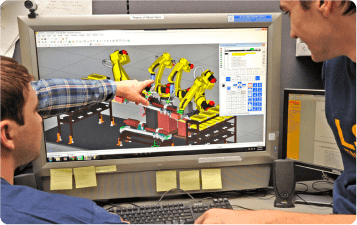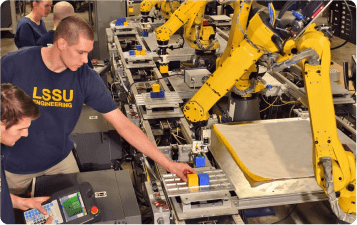
LSSU is one of the top regional public universities in the United States and was the first university in the nation to start an undergraduate program in Robotics Engineering Technology in 1985. Starting in 2018, LSSU offers a Bachelor’s degree program in Robotics Engineering.
According to Zion Market Research study, the Industrial Robotics Market was worth around $21.7 billion in 2021 and is estimated to grow to about $81.4 billion by 2028 as industries like automotive, pharmaceuticals, consumer electronics, packaging, and manufacturing continue to adopt and implement robotics at a faster rate. The International Federation of Robotics estimates that over 50 percent of production operators will be working with robots in 10 years’ time. But this demand is causing an ever growing gap in professionals with robotic skills. For over 35 years, LSSU’s Robotics programs continue to help fill this need.
The Robotics Engineering degree program combines the strengths of our engineering programs in Mechanical Engineering, Computer Engineering, and Electrical Engineering and builds on three decades of expertise in industrial robotics, including the $3M Robotics Lab, by expanding into mobile and service robotics. A detailed list of courses for the Robotics Engineering degree can be found in the LSSU course catalog.
LSSU also offer Robotics & Automation degree concentrations and minors within the following degree programs:
We want to know how we can help you achieve your dream of becoming an engineer!


Students have the opportunity to work with both mobile robots as well as traditional industrial robots. In small class settings LSSU students often get to choose their own projects; a recent team of undergraduate research students created a custom LIDAR system for a Corobot mobile robot.

Students are exposed to robotics engineering and other foundational engineering concepts early in EGNR101: Introduction to Engineering.
Lake Superior State University (LSSU) freshmen students get their first robotic experience with LEGO Mindstorms®.
Our Robotics and Automation Laboratory was recognized as one of the most complete and advanced of its kind in the country.
LSSU has specialized in robotics engineering education for more than 40 years.
The Robotics Engineering program is one of 6 ABET accredited programs in the nation.
The lab houses 14 industrial, 13 collaborative, and 14 mobile robots, various 2D and 3D vision systems, sensors and rotary index tables, using a variety of software and Programmable Logic Controllers (PLCs). Students also have opportunities to work with various marine robotic technology and drones.
Our graduates are sought out by companies including: Applied Manufacturing Technologies, FANUC Robotics General Motors, JR Automation, and Kawasaki Robotics. The mean entry level salary for Robotics Engineers is $81,743 [Payscale.com, April 2025].
More than 75 percent of our engineering classes have a laboratory component, including robotics, using industrial grade equipment.
Our average engineering class size is 14 students. Small classes provides you plenty of personal, hands-on experience, early on in your learning.
Students partner with leading industries and corporations to develop capstone projects; it is a great way of bringing our Mechanical Engineering, Electrical Engineering, Computer Engineering, Manufacturing Engineering Technology, Electrical Engineering Technology, and Mechatronics students together for interdisciplinary projects.
featuring top robots manufactured by
Team SEA (Superior Engineering and Automation) developed an automated vision alignment system to align to a steering column and perform a telescoping effort test for Nexteer Automotive. This system allows Nexteer to test how much effort it takes to push a steering column in and pull it out when a user is adjusting the steering wheel in their vehicle. The process developed by Team SEA reduced the time for the alignment process and effort test from 10 minutes with the current method to an average of 13 seconds with Team SEA’s method.
Team ALVS partnered with Esys Automation to develop a machine vision system with the capability to detect the operational status of automotive daytime running lights and center high mount stop lights. The project was broken down into four major tasks. The first task was to mount the camera and lights, then power them up. The second task was to determine an appropriate camera setup to reduce interference from ambient light sources. The third was to develop a vision algorithm to analyze the camera images. Finally the fourth part was to design a graphical user interface that would allow the future operator to begin work with the product while receiving minimal training. These four parts came together to create a product that could in the future, be used at the final inspection stage in automotive plants.
Members of our faculty and students mentor three area high school FIRST Robotics Competition (FRC) teams. We are also an FRC Kick-off site!

